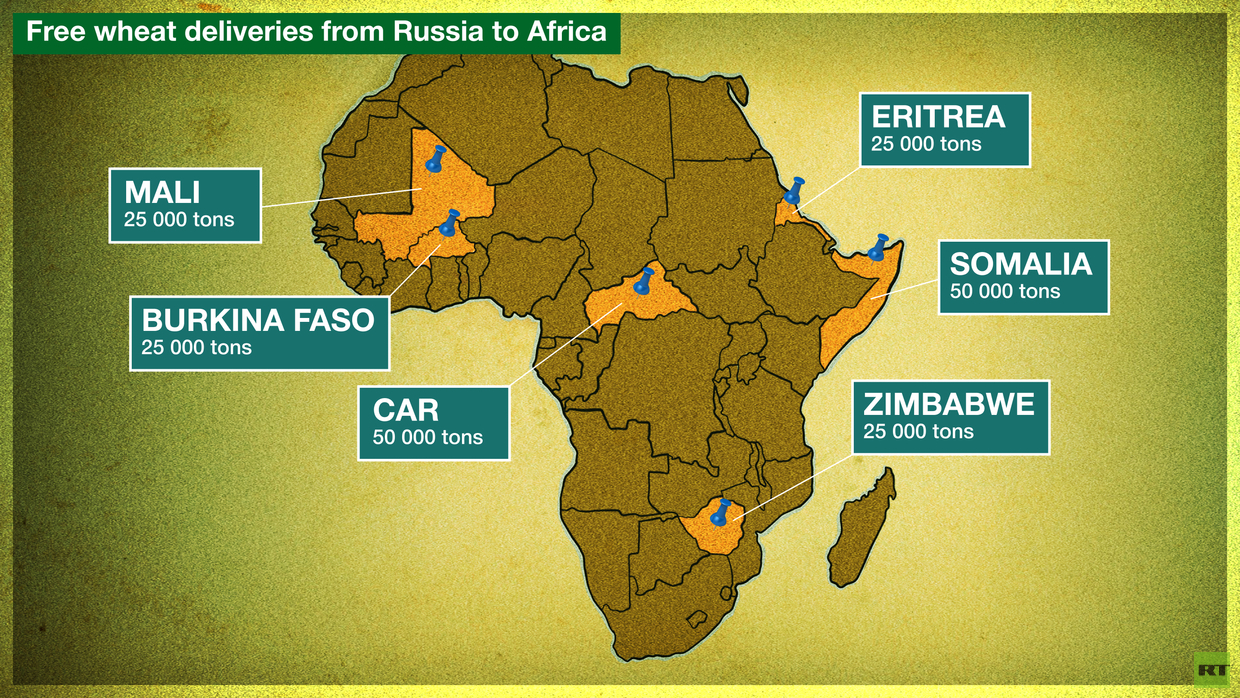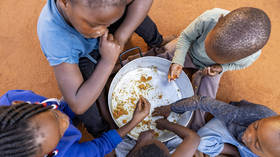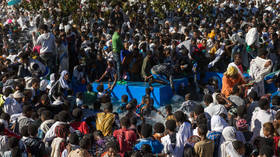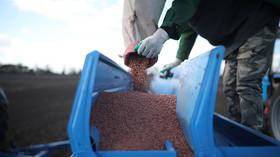The West warned of world hunger: Russia has met its promise of grain for Africa’s most-vulnerable

Much was made of the world hunger risk in July 2023 when Russia pulled out of the Black Sea Grain Deal, citing the failure of the West to keep its side of the bargain. Warnings of the risks to Africa's most vulnerable were prominent in news reports at the time. However Russian President Vladimir Putin’s decision to withdraw from the deal and circumvent western sanctions to deliver free grain to Africa has been vindicated.
Moscow has successfully completed delivery of 200,000 tons of food aid to six African nations and here's how.
In July, during the Russia-Africa summit in St. Petersburg, President Putin pledged to provide free food assistance, to six African countries. Burkina Faso, Zimbabwe, Mali, Somalia, Central African Republic (CAR), and Eritrea were slated to receive up to 50,000 tons of grain each from Russia.
Russia’s decision to provide food aid to Africa followed its withdrawal from the Black Sea Grain Initiative earlier last year. Initially brokered by the UN and Türkiye in 2022, the agreement aimed to facilitate the export of Ukrainian grain to global markets, particularly to impoverished countries in Africa. In return, Russia expected Western sanctions affecting its agricultural exports to be lifted.
However, one year after the deal, Russia withdrew, citing ongoing difficulties in exporting its grain and fertilizer to global markets and alleging that the West had failed to fulfill their obligations.
Nevertheless, Russia has announced the continuation of free grain deliveries directly to African countries, in order to help with food security.
In November, Russian Agriculture Minister Dmitry Patrushev announced the dispatch of the first two shipments of free grain to Burkina Faso and Somalia.
On February 20, during a meeting with the Russian president, Patrushev stated the first ship had departed for Africa on November 7. “The average transit time for each vessel is approximately 30-40 days,” he added.

Somalia
The first cargo ship carrying the aid arrived in the country’s port of Mogadishu on November 30. Russia’s ambassador to Somalia, Mikhail Golovanov, who arrived ahead of the delivery, handed over the free grain to Somalia’s Minister of Maritime Transport and Ports, Abdullahi Ahmed Jama.
The second shipment of Russian wheat arrived in the same port this year, on January 24, and unloading was completed by February 17, marking a total of 50,000 tons of grain.
Members of the Somali government were present at an official ceremony to celebrate the arrival of the foodstuffs. They expressed their gratitude to the Russian authorities for their assistance in ensuring food security in the country.
Zimbabwe
On December 29, 25,000 tons of wheat from Russia were delivered by ship to the Mozambican port of Beira. According to the Ministry of Foreign Affairs of the Republic of Mozambique, after unloading the vessel, the grain was delivered “by trucks overland to Zimbabwe.”
Eritrea
On January 4, Russia’s ambassador to Eritrea, Igor Mozgo reported a bulk carrier delivering 25,000 tons of free grain to the African country arrived in the port of Massawa.
“This action shows that Russia, unlike the West, does not just talk, it keeps its promises,” Mozgo noted.
Mali
On January 17, Foreign Ministry spokeswoman Maria Zakharova announced Mali had received 25,000 tons of humanitarian grain from Moscow.
“This is the fourth delivery of much-needed Russian goods to the population today on a free basis,” she stated.
CAR
On January 18, Moscow’s Ambassador to the CAR, Alexander Bikantov, informed TASS that approximately 50,000 tons of grain, provided as a humanitarian donation from the Russian people, had reached Douala Port in Cameroon.
The Russian Foreign Ministry later reported that on January 25 the unloading of two more ships delivering Russian grain at the port had been completed. Cameroon concluded an agreement to transport flour from its territory to the CAR.
Burkina Faso
On January 26, Russian Ambassador Alexey Saltykov confirmed that Moscow had donated 25,000 tons of grain to Burkina Faso as part of a humanitarian aid initiative. The arrival of wheat was marked by a ceremony in the capital Ouagadougou.
“All 25,000 tons of grain were delivered to Burkina Faso from the port of Abidjan [in Ivory Coast (Cote d’Ivoire)],” Saltykov stated.
Burkina Faso is the latest African country to receive humanitarian shipments of wheat from Russia.
Approximately 20% of the African population suffer from chronic hunger, while increasing climate pressures in the region, lack of infrastructure and investments are worsening the issue of food security. Africa welcomes Russia’s assistance in alleviating food insecurity in the most vulnerable countries, and Russia has emerged as a reliable food security provider, capable of meeting the growing need. Along with free deliveries, Russia exported 11.5 million tons of grain to Africa in 2022, reaching the 10 million-ton mark in the first six months of 2023.
Meanwhile, Uralchem, a leading Russian fertilizer producer, has donated over 134,000 tons of fertilizers to various African nations since 2022. In collaboration with the UN World Food Programme (WFP), over 111,000 metric tons have been shipped from European ports and warehouses to Malawi, Kenya, and Zimbabwe.















